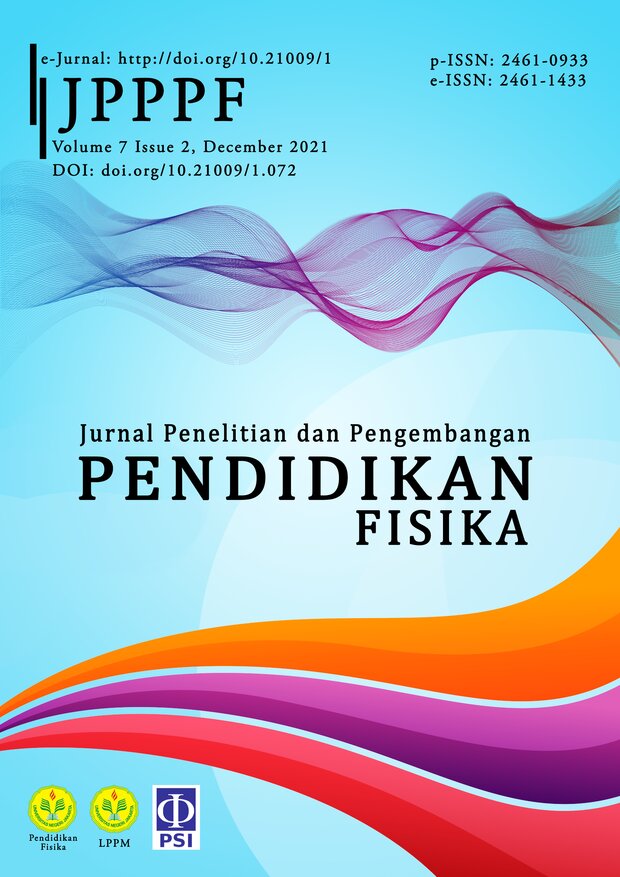The Design of Web-Based Learning Using Google Sites for Teaching Heat and Temperature Topic
DOI:
https://doi.org/10.21009/1.07202Keywords:
web-based learning, e-learning, learning media, google sites, heat and temperatureAbstract
The limited variety of learning media will create various learning problems. One of the problems that arise is the lack of motivation to learn and low learning outcomes. These problems can be overcome by developing learning media integrated with technology such as web-based learning. This study aims to produce web-based learning using Google Sites on Heat and Temperature topics for high school students. The media development used the 4D model with the following stages: 1) Define, 2) Design, 3) Develop. The design and development stages of the media involve experts who assess two aspects, namely material and media design. The average result of media expert's validation is "very feasible". The average effect of material expert validation is "feasible." Based on the validation results by experts, this media is feasible to be used as a learning medium that helps students learn Heat and Temperature topics. The weakness in this research was that the learning design on the developed media was not very relevant to the learning objectives and basic competencies. Researchers hope to develop a learning media with learning designs that are more relevant to learning objectives and basic competencies in the future.
References
Anggraeni, DM & Sole, FB 2018, ‘E-Learning Moodle, Media Pembelajaran Fisika Abad 21’, Jurnal Penelitian dan Pengkajian Ilmu Pendidikan: e-Saintika, vol. 1, no. 2, pp. 57-65.
Azis, TN 2019, ‘Strategi Pembelajaran Era Digital’, The Annual Conference on Islamic Education and Social Science, vol. 1, no. 2, pp. 308-318.
Bakri, F, Sunaryo, S, Irawan, VF, & Muliyati, D 2018, ‘E-Learning Model for Problem Based Learning on Heat and Thermodynamic Topics in High School’, Jurnal Penelitian & Pengembangan Pendidikan Fisika, vol. 4, no. 2, pp. 101 - 112.
Halim, A, Mustafa, Nurulwati, Soewarno, & Nanda, N 2018, ‘Development Of Two-Tier Diagnostic Test Based On E-Learning’, Journal of Physics: Conference Series, vol. 1120, p. 012030.
Ismawati, I, Mutia, N, Fitriani, N. & Masturoh, S 2021, ‘Pengembangan Media Pembelajaran Fisika Berbasis Web Menggunakan Google Sites Pada Materi Gelombang Bunyi’, Jurnal Ilmiah Mahasiswa Pendidikan Fisika, vol. 2, no. 2.
Januarisman, E & Ghufron, A 2016, ‘Pengembangan Media Pembelajaran Berbasis Web Mata Pelajaran Ilmu Pengetahuan Alam Untuk Siswa Kelas VII’, Jurnal Inovasi Teknologi Pendidikan, vol. 3, no. 2, pp. 166-182.
Lisnaeni & Salsabila, BZ 2021, ‘Efektifitas E-Learning Fisika Berbasis Scientific pada Materi Elastisitas dan Hukum Hooke’, Prosiding Seminar Nasional Aplikasi Sains & Teknologi (SNAST).
Lukitaningrum, H 2016, ‘Pengembangan Media Pembelajaran Berbasis Web Pada Materi Basis Data Di Sekolah Menengah Kejuruan Kelas XI’, Skripsi, Universitas Negeri Yogyakarta.
Ma’rifah, E, Parno, P & Mufti, N 2016, ‘Dampak Strategi Dual Safeguard Web-Based Interactive (Dgwi) Dengan Model Problem Based Learning (Pbl) Terhadap Penguasaan Konsep Siswa Pada Materi Suhu Dan Kalor’, Jurnal Pendidikan: Teori, Penelitian, & Pengembangan, vol. 1, no. 7.
Mahendra, MR 2021, ‘Development of Macromedia Flash-Based Mathematics Learning for Elementary School Student’, Annual Conference on Science and Technology Research (ACOSTER) 2020, vol. 1783, p. 12006.
Malik, A., Novita, Y. & Nuryantini, AY 2019, ‘Enhancing Critical Thinking Skills of Students Related to Temperature and Heat Topics Through Problem Solving- Laboratory Model’, Jurnal Penelitian & Pengembangan Pendidikan Fisika, vol. 5, no. 1, pp. 9 - 20.
Mukti, WM, Puspita, YB, & Anggraeni, ZD 2020, ‘Media Pembelajaran Fisika Berbasis Web Menggunakan Google Sites pada Materi Listrik’ Webinar Pendidikan Fisika: Optimalisasi Pendidikan dalam Rekontruksi Berbasis Sains dan Teknologi di Era New Normal. 14 November 2020.
Orooji, F & Taghiyareh, F 2015, ‘Supporting participants in web-based collaborative learning activities from a holistic point of view: a tale of seven online and blended courses’, J. Comput. Educ. vol. 2, pp. 183–210.
Rambe, P 2017, ‘Spaces for interactive engagement or technology for differential academic participation? Google Groups for collaborative learning at a South African University’, J Comput High Educ, vol. 29, pp. 353–387.
Sarah LL 2021, ‘The implementation of discovery learning using personal site in physics online classroom’, Journal of Physics: Conference Series, vol. 1957.
Setyowati, R, Sarwanto, & Muzzazinah 2021, ‘How Students’s Higher Order Thinking Skills through E-Learning during the Covid-19 Pandemic? What does it have to do with University?’, IOP Conference Series: Earth and Environmental Science, vol. 1808.
Simanjuntak, MP, Manurung, AW & Marpaung, N 2021, ‘Desain Learning Management System Berbasis Moodle Dalam Pembelajaran Suhu dan Kalor’, Proceeding Seminar Nasional IPA XI.
Taufik, M et al 2018, ‘Pelatihan Media Pembelajaran Berbasis Web kepada Guru IPA SMP Kota Mataram’, Jurnal Pendidikan dan Pengabdian Masyarakat, vol. 1, no. 1.
Wahyudi, I 2017, ‘Pengembangan Program Pembelajaran Fisika SMA Berbasis E-Learning dengan Schoology’, Jurnal Ilmiah Pendidikan Fisika, vol. 6, no. 2.
Wiwin, E, Kustijono, R & Hakim, SR 2019, ‘The effectiveness of scientific approach through the website in physics learning process at vocational high school’, Journal of Physics: Conference Series, vol. 1171.
Yuniar AR, Subandowo, M, & Karyono, H 2021, ‘Pengembangan Bahan Ajar Informatika Berbasis Google Site Custome Domain’, Jurnal Ilmiah Penelitian dan Pembelajaran Informatika, vol. 6, no. 2.
Yunita, L 2017, ‘Efektifitas Problem Based Learning Berbantuan Edmodo Untuk Meningkatkan Prestasi Belajar Fisika Studi Pada Suhu Dan Kalor Kelas X Teknik Kendaraan Ringan SMK Tunas Bangsa Wanareja’, Prosiding Seminar Nasional XI Rekayasa Teknologi Industri dan Informasi 2016 Sekolah Tinggi Teknologi Nasional Yogyakarta.
Zulkarnaini, Z 2018, ‘Penerapan Pembelajaran Berbasis Web untuk Meningkatkan Pemahaman Konsep dan Keterampilan Generik Sains Siswa Kelas X SMA pada Materi Suhu dan Kalor’, Jurnal Dedikasi Pendidikan, vol. 2, no. 2, pp. 141–152.











